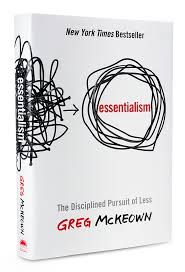 How often do we ask this important question: What is really essential in my life? Perhaps if we did ask this question more often we would find ways to reduce not only our stuff but also our stress. As Greg McKeown puts it "essentialism isn't about getting more done in less time. It's about getting only the right things done." Our world is filled with more choices, more social media platforms, more news outlets, more commitments, and seemingly less time to accomplish all we need to do. But, what if we began by examining what we "need to do" in terms of what is really essential? Getting to this point seems impossible but McKeown provides us with a clear roadmap and some practical advice for living as essentialists. Study after study shows that not only are children suffering from being over-scheduled but so are their parents who are responsible for the scheduling in the first place. Clearly, everyone could benefit from focusing only on the essentials.
What works against this view is our perception that it can't be done. After all, everything is urgent. But, being "urgent" is not the same as being "important" (or essential). Being an essentialist entails being more mindful especially when deciding what to spend your money and time on. Instead of thinking "I have to," think "I choose to." Instead of thinking "everything is important," recognize that "only a few things really matter." Instead of saying "yes" "to people without really thinking" try saying "no" "to everything except the essential." As McKeown points out "if you don't prioritize your life, someone else will." Of course, this won't be easy. People wear their busyness like a badge of honor and will question why you are not busy too. People may even see your lack of busyness as a justification for asking you to do more. Then we worry about offending people by not saying "yes" to their requests. But, there are graceful ways to say "no" and more often than not saying "no" won't offend but will engender respect. A central feature of economics is the notion that life consists of trade-offs. You can spend your money on one thing but then that money is unavailable to spend on something else. Similarly, you can spend your time doing one thing but then that time is unavailable to spend on some other activity. No one can escape this feature of life. What we can do is decide how to face it. McKeown provides a strong argument for approaching trade-offs as an essentialist. Ironically, by deciding to pursue less you will end up with more. More happiness, more success, more time. In other words, more of the essentials, less of everything else. Comments are closed.
|
KEVIN J. BROWNEPhilosopher / Educator These blog posts contain links to products on Amazon.com. As an Amazon Associate I earn from qualifying purchases.
Categories
All
Archives
April 2023
|



 RSS Feed
RSS Feed
















